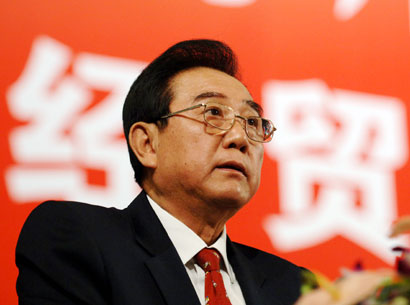|
New policies issued to boost cross-Straits trade
(Xinhua)
Updated: 2006-04-15 15:53
The Chinese mainland announced a new package of policies to promote economic
and trade relations across the Taiwan Straits on Saturday.
Chen Yunlin,
director of the Taiwan Works Office of the Communist Party of China (CPC)
Central Committee, made it public at the end of the two-day Cross-Straits
Economic and Trade Forum, as a further step the mainland has taken to boost
cross-strait exchanges and cooperation in favor of Taiwan compatriots.

Chen Yunlin, director
of the Taiwan Works Office of the Communist Party of China (CPC) Central
Committee, announces a new package of policies to promote cross-Straits
trade at the closing ceremony of the Cross-Straits Economic and Trade
Forum in Beijing April 15, 2006.
[Xinhua] |
The package is comprised of three
sets of policies directly stipulated by the State Council and 13 others
formulated by relevant central government departments.
The three sets of
State Council policies are as follows:
-- To add four species in a list
of Taiwan-grown fruits, which currently have 18 species, for Taiwan exporters.
-- To adopt a zero-tax on imports of 11 kinds of vegetables produced by
Taiwan farmers.
-- To allow more imports of Taiwan's aquatic products,
with zero-tax on some of the products, and allow Taiwan fishing boats to enjoy
equal policies as their mainland counterparts for selling their own products.
Under the other new policies, three more cross-straits agricultural
cooperation pilot zones will be set up in the mainland cities of Foshan and
Zhanjiang, in Guangdong Province, and Yulin, in the Guangxi Zhuang Autonomous
Region.
Moreover, Zhangpu City, Fujian Province, and Qixia City,
Shandong Province, will establish two hatching gardens for Taiwan farmers.
Secondly, the mainland's federation of supply and marketing cooperatives
will help organize mainland farm-products dealers to visit Taiwan for group
procurements, during the peak seasons of fruit harvest.
Thirdly, a
special marketing center will be set up in Xiamen City, Fujian, bring
convenience and reduce cost for Taiwan's fruit imports.
Fourthly, the
mainland will open a "green corridor" transportation of Taiwan fruits, to reduce
their shipping cost.
Fifthly, the mainland will recognize university
diplomas issued in Taiwan.
Sixthly, the mainland will issue the Method on
the Management of Mainland Residents to Visit Taiwan Area.
Seventhly,
the Ministry of Public Security adds Shenyang, Dalian and Chengdu cities to
issue valid passes for Taiwan visitors to enter the mainland, in addition to the
existing five cities of Haikou, Sanya, Xiamen, Fuzhou, and Shanghai.
Eighthly, Taiwan people will be allowed to become customs agents after
passing official examinations in the mainland.
The ninth to twelfth policies
include a good news for Taiwan patients and a big gift for Taiwan individuals
and institutions engaged in medical services.
Special clinics will be
established for Taiwan visitors in some mainland cities. Doctors working in
these clinics could come either from the mainland or from Taiwan, but they have
to acquire official approval by the relevant mainland authorities.
In
the future, Taiwan visitors may receive necessary documents from mainland
hospitals and clinics for their convenience such as reporting medical
expenditure, when they return home.
Taiwan investors will be allowed to
set up joint venture hospitals in the mainland with local partners, while Taiwan
investors could hold as much as 70 percent of the stake.
Taiwan
compatriots will be allowed to get license for medical practice in the mainland,
after they pass official examinations. They are permitted to work in the
mainland for a period of one year, but the term could be extended by relevant
mainland authorities, once it expires.
|
| |
|
| |
|